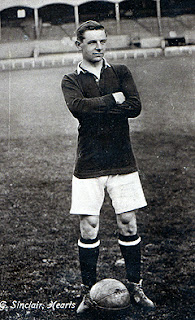Two players who were part of the most famous Hearts team of them all.
Forgotten Scotland Players: George Sinclair
Football in Scotland didn't stop during the conflict of 1914-1918. Players, officials and supporters fought for their country. Many never returned.
But, rightly or wrongly, the game continued. It did so against a backdrop of criticism and recrimination that the sport was ignoring its patriotic duty and encouraging others to do the same.
Yet some players had answered the country's call without delay.
One of those was the Hearts winger George Sinclair. Formerly a regular soldier he'd left the army in 1905.
He signed for an under performing Hearts in 1908. When George McCartney replaced James McGhee as manager he decided that Sinclair was of only four players who would meet the standard he was demanding.
Sinclair, he recognised, was one of the finest wingers in Scotland. In a new era for Hearts he was deserving of his place.
Scotland's selectors seemed to agree. In March 1910 Sinclair made his Scotland debut against Ireland in Belfast as the Scots fell to a 1-0 defeat.
As McCartney strove to build a team that would achieve his goal of being the "perfect combination," Sinclair continued to impress.
In 1912 he was again called into the Scotland team. On 3rd March he was part of the team that beat Wales 1-0 in front of 31,000 fans at Tynecastle.
Two weeks later he got his revenge in Belfast as Scotland, sent on their way by a first half double from Blackburn's Walter Aitkenhead, beat Ireland 4-1.
Two years on and McCartney's Tynecastle dream was coming close to being realised.
In the summer of 1914 Hearts played a friendly in a Copenhagen before returning to Edinburgh to beat Hibs 6-0 in the Dunedin Cup.
People suddenly realised that McCartney might have been deadly serious when he predicted that his team would win the league.
Then, on 4th August, Britain wasn't provided with the assurances it demanded that Belgium's neutrality would be respected by an advancing German Army.
The European powder keg had exploded and Britain was about to join the conflagration.
When Sinclair had left the Field Artillery in 1905 he had made a commitment to rejoin the forces in the event of such a conflict.
On 5th August 1914, in keeping with that agreement, he rejoined his battery. Britain was at war. And so was George Sinclair.
Driver George Leckie Sinclair of the Royal Field Artillery didn't serve in the famous McRae's Battalion that became inexorably linked to Hearts.
His war took a different route. And he was one of the lucky ones.
Injured while on active service he was discharged from the army. His injuries weren't serious enough to stop him from playing football and he returned to see out his career with Hearts, playing his last game in 1920.
He was also apparently spared the after effects that scarred the lives of so many veterans.
When a free scoring Hearts side, perhaps fulfilling the destiny that was denied the team of 1914, won the championship in 1958 Sinclair was running a pub in Edinburgh's Abbeyhill.
Forgotten Scotland Players number 10: George Sinclair, Hearts. 3 caps.
Forgotten Scotland Players: Bob Mercer
When George McCartney began his rebuilding job at Tynecastle he immediately recognised that the player he could build the team's success on was already at the club.
Robert 'Bob' Mercer was a young centre half when he first met McCartney.
In the pre-war years footballs were like boulders, boots like concrete and defenders were rugged characters. Mercer was a modern centre half before the phrase was invented.
Ball playing, skillful. Classy.
He was the young talent at the centre of the manager's "perfect combination" philosophy.
He was just 22 when he made his Scotland debut, alongside team mate George Sincliar, in the 1-0 win over Wales at Tynecastle.
His second cap came in March 1913 as Scotland beat Ireland 2-1 in Dublin.
Mercer was injured during the course of Hearts' impressive start to the 1914-15 season. An October return proved too soon for his damaged ligaments and he was ruled out again.
Despite his injury, as the captain of the league leaders and as one of Scotland's bright young things he was a lightning rod for the ire of those who felt football wasn't pulling its weight in the war effort.
When Hearts answered the call from McCrae's Battlalion, Mercer's injury meant he was unable to join his team mates.
15 players did join McCrae's Own. Three of them were to die on the first day of the Battle of the Somme on 1st July 1916.
Mercer was eventually to join the Royal Garrison Artillery. In 1918 he was caught in a severe gas attack.
Unlike many of his team mates he survived. He returned to play for Hearts for another two seasons.
In 1919 he joined George Sinclair in the side that won the SFA's Victory Cup.
It was clear, however, that Mercer wasn't the same player. When a doctor diagnosed a weakened heart, Hearts insisted he retire. He reluctantly left the club but went on to play another couple of seasons with Dunfermline.
In 1926 he played a game as a guest for Hearts in Selkirk. He collapsed and died of heart failure.
The "war to end all wars" had claimed another victim.
Forgotten Scotland Player number 11: Bob Mercer, Hearts. 2 caps.
31 Hearts players saw service during the First World War. Six were killed in action. Another three died during the conflict. Three more, including Bob Mercer, died after 1918 as a consequence of injuries suffered during the war.


Neither player are forgotten by the Heart of Midlothian, although George Sinclair gets less mention than those who died or served with 'McCrae's.'
ReplyDeleteA very good and interesting item, thank you for this.
Thanks for the comment
ReplyDeleteTom